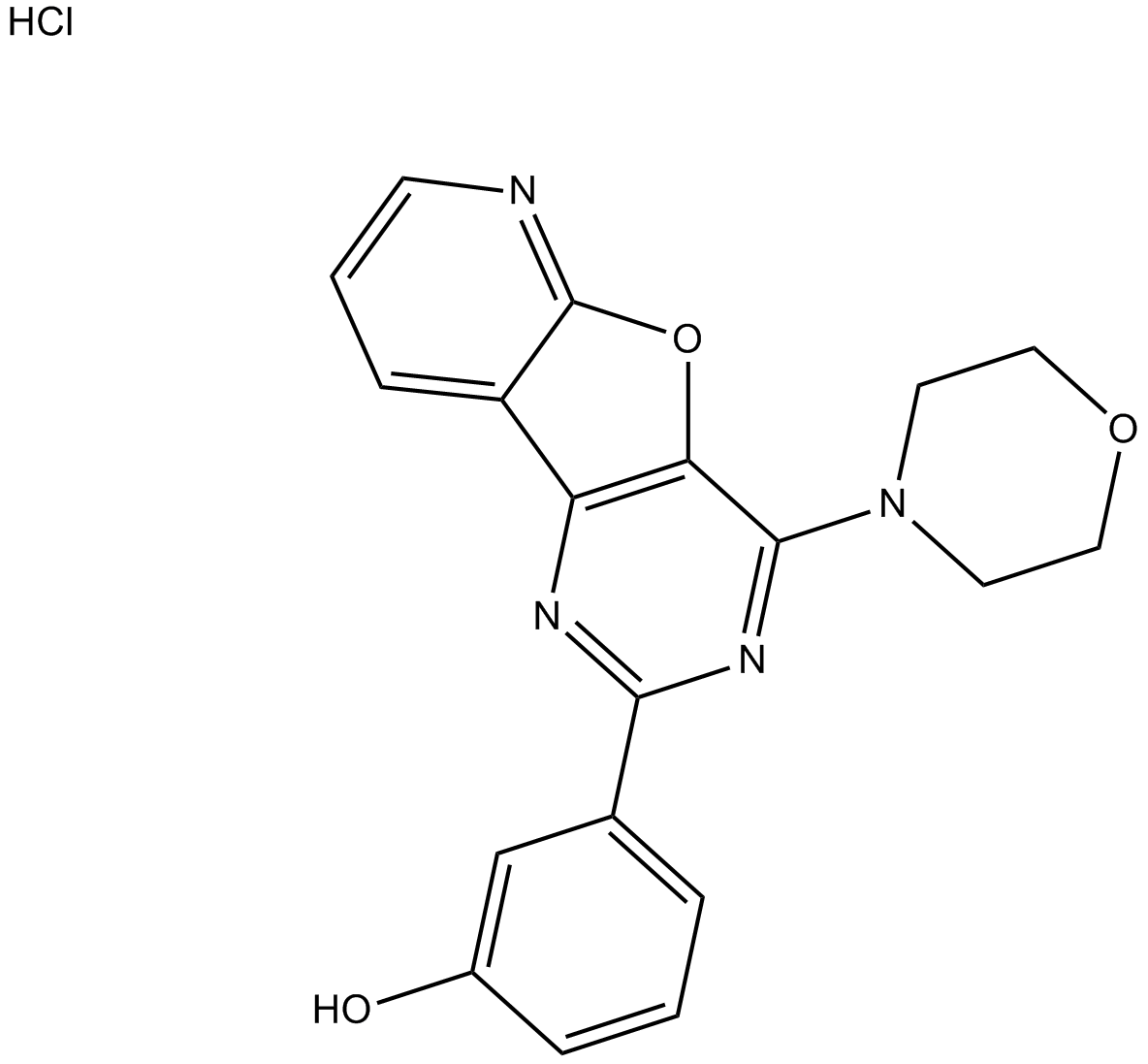PI-103 Hydrochloride (Synonyms: PI 103 hydrochloride;PI103 hydrochloride) |
| Catalog No.GC16379 |
A potent, cell-permeable PI3K inhibitor
Products are for research use only. Not for human use. We do not sell to patients.

Cas No.: 371935-79-4
Sample solution is provided at 25 µL, 10mM.
PI-103 is a dual inhibitor of PI3K/Akt and mTOR with IC50 value of 0.002 μM , 0.003μM, 0.003μM, 0.015μM, 0.030μM for P110α, P110β, P110γ, P110 and mTOR, respectively [1].
PI3K/AKT/mTOR pathway is an intracellular signaling pathway and plays an important role in regulating cell cycle. It has been shown that PI3K/AKT/MTOR pathway is directly related to cellular quiescence, proliferation, cancer, and longevity. And many studies have shown that activation of the PI3K/Akt signaling pathway is correlated with poor prognosis in a variety of cancers which demonstrated that inhibition of the pathway may be regarded as a promising therapy [2, 3].
PI-103 is a selective PI3K/Akt and mTORC1 inhibitor. When tested with leukemic cell lines (MOLM14, OCI-AML3 and MV4-11) with activation of PI3K/Akt, mTORC1 and ERK/MAPK signaling pathways, PI-103 blocked cells proliferation via inhibiting PI3K/Akt and mTORC1 activity in a concentration of 1μM [4]. In HCC cell line--Huh7 cells, treated PI-103 alone or combined with sorafenib inhibited cells proliferation in a dose-dependent manner through inhibition of PI3K/Akt and mTORC1 pathways [5]. When tested with U87MG glioblastoma cells, PI-103 treatment in 30 nM/L showed significant inhibition of PI3K/Akt and mTORC1 phosphorylation [1]. In neuroblastoma cell lines SK-N-BE (2), IMR-32 with amplified MYCN, PI-103 inhibited cell growth in a time- and concentration-dependent manner via inhibiting PI3K/Akt and mTORC1 activity [3].
In SK-N-BE (2) with MYCN-mutant xenografted nude mice model, treated PI-103 intraperitoneally (10 mg/kg) markedly reduced the tumor volume index and tumor weight via inhibiting PI3K/ mTOR pathways [1].
References:
[1]. Raynaud, F.I., et al., Biological properties of potent inhibitors of class I phosphatidylinositide 3-kinases: from PI-103 through PI-540, PI-620 to the oral agent GDC-0941. Mol Cancer Ther, 2009. 8(7): p. 1725-38.
[2]. Hambright, H.G., et al., Inhibition of PI3K/AKT/mTOR axis disrupts oxidative stress-mediated survival of melanoma cells. Oncotarget, 2015.
[3]. Segerstrom, L., et al., Effects of small molecule inhibitors of PI3K/Akt/mTOR signaling on neuroblastoma growth in vitro and in vivo. Int J Cancer, 2011. 129(12): p. 2958-65.
[4]. Park, S., et al., PI-103, a dual inhibitor of Class IA phosphatidylinositide 3-kinase and mTOR, has antileukemic activity in AML. Leukemia, 2008. 22(9): p. 1698-706.
[5]. Gedaly, R., et al., PI-103 and sorafenib inhibit hepatocellular carcinoma cell proliferation by blocking Ras/Raf/MAPK and PI3K/AKT/mTOR pathways. Anticancer Res, 2010. 30(12): p. 4951-8.
Average Rating: 5 (Based on Reviews and 30 reference(s) in Google Scholar.)
GLPBIO products are for RESEARCH USE ONLY. Please make sure your review or question is research based.
Required fields are marked with *




















